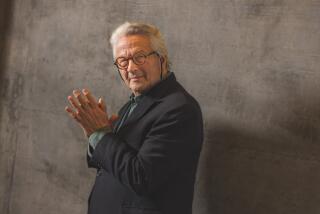Fearless Fred Miller Puts Athletes to Test
- Share via
In the world of sports, there are these two czars we will identify as Park Avenue Pete and Peter the Great of Mt. Olympus.
These fellows will never be known as Pistol Pete or Pistol Peter, because they are slow-draw artists. At the legendary OK Corral, they would have been contemplating their alternatives all the way to Boot Hill.
If Pete and Peter met over a game of chess, they would put each other to sleep between moves. They probably could fall asleep during a tennis match, for that matter.
The bolder of the two seems to be Peter the Great, whose version of punishment was to force erring subjects to make tax-deductible donations to charitable organizations and spend part of their five-month vacations doing community-service work. Some of them would have to survive on a mere $900,000 a year.
These subjects were professional athletes, of course, and their transgression was the abuse of drugs.
Of course, Park Avenue Pete has some ideas on that subject. This week’s National Collegiate Athletic Assn. News published an observation by Pete which apparently places the blame where he thinks it belongs.
“We inherit this drug problem from the colleges,” Pete said. “These kids are already into this stuff before we ever get to draft them.”
Clean up America’s university athletes, he seemed to be saying, and you clean up America’s professional athletes.
This can be known as either passing the buck or dropping the ball. Take your pick.
Regardless, neither Peter the Great nor Park Avenue Pete have really taken charge of the situation that threatens the credibility of their sports.
They should be introduced to a fellow we will call Fearless Fred Miller. He is the director of athletics at San Diego State University.
Fred shall be known as Fearless because he, too, had a problem with athletes and the specter of drugs. He attacked it unilaterally, thereby taking a giant step toward repairing the faltering credibility of his institution.
Pete and/or Peter, confronted by the same situation, probably would ask the athletes in question if they would deign to cooperate. Either that or announce that an investigation would ensue, the results to be forthcoming in July.
Fearless, you see, learned that a couple members of the San Diego State track team might well have been involved with forbidden anabolic steroids. He could not have known for sure, but he was determined to find out.
Thus, he suspended them, advising them that they could return if tests proved their innocence. This seemed rather discriminatory to them, and they balked.
At about this same time, it was learned that an assistant track coach had been reassigned.
Though the suspension of the athletes and the reassignment of a man who happened to be their coach have never formally been linked, these two events came together like water and dirt.
What they created was mud.
Fearless Fred, unaware of the quagmire in his wake, retired to his home in the Arizona for the weekend. He would enjoy a couple of days of quiet contemplation amid the lizards and the cactus and come back refreshed.
In his absence, the mud began to fly. A former athlete had this to say about that former coach. And a different former coach had this to say about that former athlete. It began to sound as if San Diego State’s athletes had medicine cabinets rather than lockers.
Understandably, Fearless Fred was chagrined upon his return. The air had been thoroughly polluted by the flying debris, and the issues obscured.
Fearless could do nothing about 1983 or 1984 or even 1985. The nature of yesterday is that it cannot be altered.
Fred Miller could do something about today--and tomorrow. He would act swiftly, surely and maybe a little boldly.
Fearless Fred would suspend every member of the San Diego State track team. Every man. Every women. Period.
His university would not be known as Steroid State.
“There is no place in this athletic program for substance abuse,” he said, “and a complete medical examination for all sports, consistent with new NCAA guidelines, will be in place by fall of ’86.”
Miller made this announcement early Monday evening. He had not terminated the program, merely suspended it. In a sense, it was more a collection of individual suspensions than a team suspension. Each athlete regains eligibility when he or she passes a test for substance abuse.
“I’ll take the test tonight,” said Drew Pierson, a senior high jumper, “and so would most of the other athletes. You’re talking maybe a couple of bad apples. We have to take the bad apples out and clean up the whole crop.”
Pierson said he was 100% behind Fearless Fred. Dixon Farmer, the men’s track coach, said he was 100% behind Fearless Fred.
Fred Miller had done the right thing.
Of course, he might find himself challenged. One or two of these student/athletes just might have an attorney who relishes publicity.
In his bid to clear the air, Miller might have stumbled upon murky legal waters.
“If legal problems come they come,” he said. “I think we have an extremely defensible position. I feel we’re on safe ground. If we’re not on safe ground, at least we’re on solid ground.”
Pete and Peter spend considerable time worrying about the ground on which they stand, as right they should. Their domains have been on shaky terrain of late.
These czars could learn a thing or two from Fearless Fred. When the air is filled with dirt, don’t go after it with a whisk broom. Clean it out with a hurricane.
More to Read
Go beyond the scoreboard
Get the latest on L.A.'s teams in the daily Sports Report newsletter.
You may occasionally receive promotional content from the Los Angeles Times.










